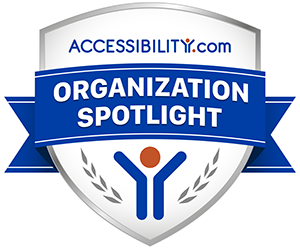
Anyone can be affected by Domestic Violence and sexual assault, but people with disabilities experience abuse at more than twice the rate of people without disabilities. People with disabilities are sexually assaulted at nearly 3 times the rate of people without disabilities. Approximately 80% of women and 30% of men with developmental disabilities have been sexually assaulted – half of them more than 10 times. Living with a disability can be isolating which increases a person’s risk of abuse and limits their options. Many times available resources to maintain independence and autonomy are exploited and controlled by their abusers.
Because abuse is about power and control, people with disabilities face unique challenges and barriers to accessing support. According to the Equal Rights Center, people with disabilities face additional barriers when seeking help. They may also feel more isolated and feel they are unable to report the abuse, or they may be dependent on the abuser for their care. In 2008, intimate partners perpetrated 27% of violent crime against people with disabilities. A study conducted by the Spectrum Institute Disability and Abuse Project found that 70% of respondents with disabilities experienced some form of abuse by an intimate partner, family member, caregiver, acquaintance or stranger.
Violence against people with disabilities, particularly women who are deaf/mobility-impaired/blind, happens because of attitudes toward women together with vulnerability from the conditions that result from the disability itself:
- Being physically less capable of defending themselves
- Difficulty in reporting maltreatment due to communication barriers
- Inaccessibility of information and counseling due to physical barriers and lack of accessible forms of communication (particularly for blind, visually impaired, deaf)
- Lower self-esteem due to being seen only as a person with a disability
- A greater amount of dependence on other people for care
- Fear of reporting abuse because it might result in a loss of the care they may require
Victims often stay with their abuser for reasons such as economic, cultural, and fear of losing custody of the children. Perhaps most important, victims fear increased violence or death if they leave. The most dangerous time for a victim is when she’s trying to leave. For people with disabilities, it can be even worse. If they are being abused by someone they rely on to take care of them, they may feel trapped. Another reason they often stay with their abuser is because they have a 31.6% poverty rate. Lack of available resources and support can cause victims to feel their options for leaving are limited. They may be forced to rely on government support, keeping them impoverished and in many cases, dependent on their abuser.
Victims of DV and sexual assault need supports and services such as accompaniment to the hospital, DA’s office, police department, court; and many other agencies. In addition, people with disabilities may also need assistive technology, use of remote video in obtaining a protective order, mobility assistance, ASL interpreters, assistance in obtaining medications when an abuser has taken them away, and assistance in applying for and obtaining benefits such as SSI and SSDI.
If you need assistance, accessible supports and services are available! BRIDGES provides advocacy for people with disabilities and connects you with necessary resources.




